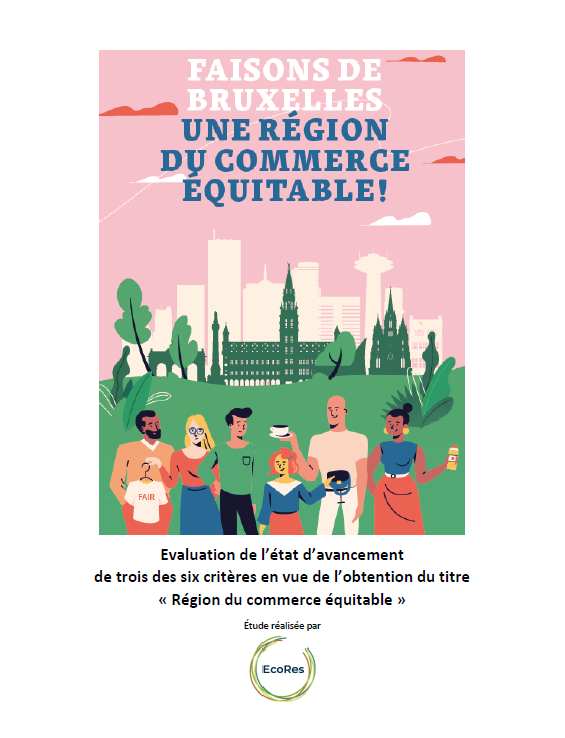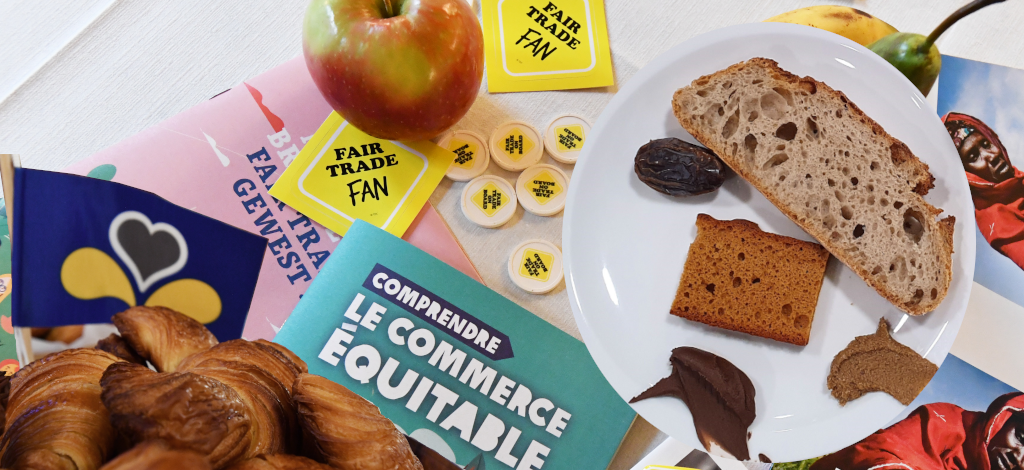“Let’s make Brussels a fair trade Region”: the results of the 2021-2023 campaign
The campaign aiming to make Brussels a fairer region was officially launched in the Brussels Parliament in May 2021. Two years later, Brussels International has published a study on the development of fair trade practices in regional public services.
A campaign and six criteria for the “fair trade Region”
It was in 2020 that Enabel’s Trade for Development Centre, the “Communes du commerce equitable” campaign (co-managed by Oxfam Magasins du Monde, Fairtrade Belgium and Miel Maya) and Brussels International (administration of the Brussels Regional Public Service-BRPS) joined forces to coordinate the first fair trade campaign at a regional level. To this end, Brussels International commissioned the Sonecom/Dris/CPCP consortium to realize an initial study to provide an assessment on the current situation and prospects for making Brussels a fair trade Region. This study made it possible to refine the 6 criteria for achieving the title.
What criteria are currently being met and to what extent?
Two years after the assessment and the official launch of the campaign, it is important to evaluate what has been achieved. The Brussels coordination team has confirmed that criteria 3 (municipalities), 5 (steering platform) and 6 (sustainable and local products) have been met. As the achievement of the other criteria was more uncertain, Brussels International commissioned an evaluation from EcoRes. The consultancy cooperative collected data on awareness-raising and communication (criterion 4), as well as on the consumption of fair trade products, both food and non-food, by public services (criterion 2) and the Brussels Government and Parliament (criterion 1). It then compared the data collected with that for 2021.
Findings after two years of campaigning
Of the 35 Brussels bodies contacted (Parliament, cabinets, government departments and OIP), 25 responded to the survey.
It is possible to observe an improvement between 2021 and 2023 in terms of awareness of fair trade among public bodies: 16 respondents said they were fully aware of the principles of fair trade, compared with 9 in 2021. As a matter of fact, two-thirds of the respondents were aware of the Brussels campaign. Despite these significant results, communication efforts are needed on a regular basis: only 10 of the 25 respondents confirmed that they carry out specific awareness-raising campaigns on fair trade (at the end of the year, at Easter, etc.).
And what about the consumption of fair trade products? 22 organizations assure that they buy fair trade food products. An analysis of their responses reveals that the award criteria ‘price’, ‘organic labelling’ and ‘fair trade labelling’ are of great importance, while criteria relating to carbon emissions, social clauses and circular impacts are of lesser importance. On the other hand, for non-food product contracts, only 7 organizations include fair trade criteria.
Let’s take a closer look at respondents’ preferences for purchasing and consuming fair trade food products: coffee ranks highest on the list, followed by tea and chocolate/snacks. These purchases are mainly intended to supply permanent areas (cafeterias, vending machines) via long-term public procurements. New products have also appeared: honey, jam and spreadable chocolate. It should be noted, however, that the vast majority of the suppliers mentioned are companies that are not specifically positioned in the fair trade and/or sustainable market and are not members of the Belgian Fair Trade Federation.
Action plans
In view of the responses received to the survey, EcoRes has identified 10 key actions to boost the achievement of the Brussels campaign criteria. These actions include: the creation of a practical guide and examples on how to integrate specific clauses into public procurement contracts; the setting up of an inter-institutions circle comprising two contact persons per organisation; the promotion of short fair trade circuits; the integration of fair trade into Enterprises’ Social Responsibility (ESR) strategies; and the need to raise awareness of the environmental impacts of fair trade practices.
All the recommendations can be found in the study, which can be downloaded here (in French) :
 |
In the coming months, the coordinating team of the campaign to make Brussels a fair trade Region will be working to implement several courses of action, ensuring that wherever possible we collaborate with other public and private players in the field of sustainability.
Together, let’s make Brussels a fair trade Region, demonstrating that a fairer future is within reach.



